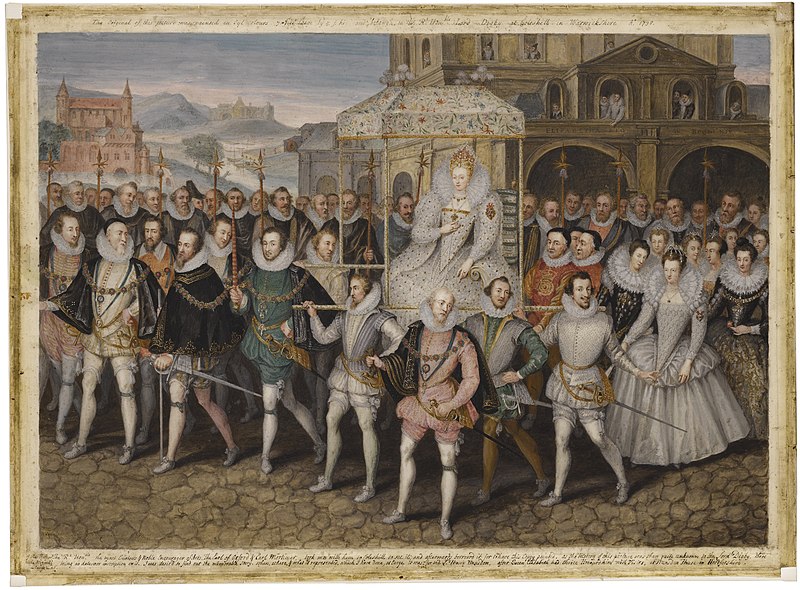By Dr. Martin Maw
The life of Sir Robert Dudley, Earl of Leicester (1532-1588) was every bit as opulent and complex as one of the grand dresses in which Elizabeth I was pictured wearing in her pomp, a Gloriana presiding over the vast hive of the Tudor court. Dudley knew that hive inside out: its drones, its honeyed talk and the potentially lethal stings of its intrigues, and most of all its Queen. Perhaps the most ambiguous figure in English royal history, Dudley was more than a friend but less than a full consort to his virgin monarch, a male confidant on intimate terms with the most powerful woman of her age. That his first wife had died in odd circumstances made the warmth and depth of this long friendship with Elizabeth all the more questionable. Given the queasy political climate of 16th century England, however, some things were better left unsaid. The Earl had influence, and didn’t hesitate to use it: more than one of his adversaries or associates ended up on the scaffold, including Mary, Queen of Scots. To prosper at Elizabeth’s court one needed the sweetness of a lawyer and the sharpness of hawk, and Dudley had both. “I stand at the top of the hill,” he wrote in 1576, “where I know the smallest slip semeth a fall.”

Nor did the demands on him lessen with age. In his last months, Dudley was at the heart of the preparations to repel the Spanish Armada, and arranged the queen’s extraordinary visit to Tilbury docks to mark its defeat. He was Elizabeth’s arch favourite and Master of Horse, a stoic and dainty campaigner who triumphed where others often quailed or stumbled over court intrigue. More benignly, he also used his influence to become a patron of the arts. It was in this capacity that Dudley has some claim to being the founding father — or, more accurately, the midwife — of Oxford University Press.

Accordingly, in 1584 he was presented with a Latin “Supplication,” a brief to argue Oxford’s case with Elizabeth. Presumably drafted by an academic committee, the document makes interesting reading. For one thing, it’s an early example of Oxford’s renowned ivory tower vagueness. It cites the precedent of “a man living in Oxford fifty years ago, more or less, who used to print books”: an impression is instantly conjured up across the centuries of an august university don trying to recall some jolly tradesman in a rather obscure nook of the city. More seriously, the document also parades the Renaissance ideal of modern scholarship nourished by wisdom from a bygone age. European thought had considered it “self-evident that where there is a settlement of scholars, there should be printers, so that books can be printed … and texts most carefully collated.” A sanctioned press at Oxford would rescue “very important manuscripts foully beset by dust and rubbish” in the university’s libraries, employing English scholars to prepare new editions and so — changing the emphasis of the appeal — “blot out the charge of laziness brought against them by foreigners.” Moreover, the new printing business would provide “pure streams of improved literature” to displace “frivolous trifles,” improving the cultural life of “England, Wales, and the hitherto barbarous realm of Ireland.” Tellingly, these clauses were designed to appeal to Elizabeth’s patriotic sentiment at a time of great national uncertainty, and its framers seemed to take their success as a foregone conclusion. The text closed with a nod to fait accompli: “God prosper it!”
Their confidence was well-founded. Although Dudley obtained no official charter, Elizabeth apparently brushed aside the “Supplication” as a mere formality. Oxford moved into legally recognised printing work within months, whereas Dudley himself became entangled in the Dutch Revolt against Spain. It seems that he contracted a serious illness in the Netherlands, probably malaria. That infection proved fatal. Shortly after the defeat of the Armada, Dudley died at Cornbury in Oxfordshire — by coincidence, the future home of another Chancellor, the Earl of Clarendon, whose name was also to become associated with the Press. Though neither he nor Elizabeth lived to see it, Oxford’s printing did indeed prosper, and the sense of their own close relationship passed into folk-lore and literature. To take only one example, when T.S. Eliot decided to “do the police in different voices” and capture London as a fractured chorus of disappointment in the cut-up images of in The Waste Land (1922), he had Elizabeth and Dudley haunt the Thames on the royal barge, an apparition which could easily be imagined during the grand flotilla which has just marked the Diamond Jubilee of the present Queen. Their ghosts would no doubt be confused or distressed by much today — yet both Dudley and his Gloriana could hardly fail to be astonished by Oxford University Press. The press they helped to found has not only survived and matured, but now flourishes on an unprecedented scale around the world in this, the second Elizabethan age.
Dr. Martin Maw is the Archivist of Oxford University Press. Visit the Oxford University Press Archive online and visit the museum by appointment.
Subscribe to the OUPblog via email or RSS.
Subscribe to only history articles on the OUPblog via email or RSS.


[…] Press is much older than Jericho itself; Oxford University has been involved with the book trade since the 15th century. Earlier print shops were set up in Broad Street in the centre of Oxford, at the Sheldonian Theatre […]
[…] year was learning the press’s history. The first of I hope many posts from our archivist: “Sir Robert Dudley, midwife of Oxford University Press” by Martin […]